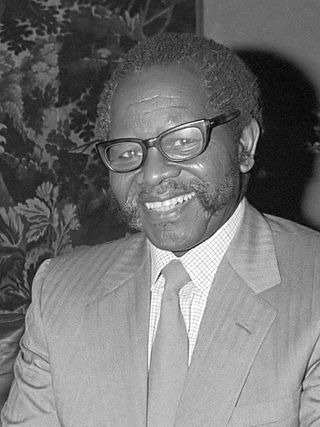
uMkhonto we Sizwe was the paramilitary wing of the African National Congress (ANC), and was founded by Nelson Mandela in the wake of the Sharpeville massacre. Its mission was to fight against the South African government.
William Joseph Kelly is an American artist, humanist and human-rights advocate.
Consociationalism is a form of democratic power sharing. Political scientists define a consociational state as one which has major internal divisions along ethnic, religious, or linguistic lines, but which remains stable due to consultation among the elites of these groups. Consociational states are often contrasted with states with majoritarian electoral systems.

Seán Patrick O'Malley is an American cardinal of the Catholic Church serving as archbishop of the Archdiocese of Boston in Boston since 2003. He is a member of the Order of Friars Minor Capuchin and was elevated by the Vatican to the rank of cardinal in 2006.

Sathyandranath Ragunanan "Mac" Maharaj is a retired South African politician affiliated with the African National Congress, academic and businessman of Indian origin. He was the official spokesperson of the former President of South Africa, Jacob Zuma.

The apartheid system in South Africa was ended through a series of bilateral and multi-party negotiations between 1990 and 1993. The negotiations culminated in the passage of a new interim Constitution in 1993, a precursor to the Constitution of 1996; and in South Africa's first non-racial elections in 1994, won by the African National Congress (ANC) liberation movement.

Robert Malley is an American lawyer, political scientist and specialist in conflict resolution, who was the lead negotiator on the 2015 Iran nuclear deal known as the Joint Comprehensive Plan of Action (JCPOA). He is currently the U.S. Special Envoy to Iran, tasked with bringing the United States and Iran into compliance with the Iran nuclear deal abandoned by President Donald Trump.

Amy Elizabeth Biehl was an American graduate of Stanford University and an anti-Apartheid activist in South Africa who was murdered by Cape Town residents while a black mob shouted anti-white slurs. The four men convicted of her murder were pardoned by the Truth and Reconciliation Commission.
Tony D'Arcy was a senior leader in the Irish Republican Army (IRA) who died as a result of a 52 day Hunger-strike at the age of 32.

The Native Labour Act, 1953 was a South African law that formed part of the apartheid system of racial segregation in South Africa. The effect of the law was to prohibit strike action by black Africans.
The South African Party was a small political party in South Africa from 1977 to 1980.
Ephraim Isaac is an Ethiopian scholar of ancient Ethiopian Semitic languages and of African and Ethiopian civilizations. He is the director of the Institute of Semitic Studies at Princeton University and the chair of the board of the Ethiopian Peace and Development Center.

Hizkias Assefa (1948) is a conflict mediator known widely in Africa for his non-aligned work as a consultant who has mediated in most major conflict situations in sub-Saharan Africa in the past 20 years, as well as in a dozen countries elsewhere. He is also a professor of conflict studies. Of Ethiopian origin, he is based in Nairobi, Kenya. He was one of the founding faculty members in 1994 of the Conflict Transformation Program at Eastern Mennonite University.

Reconciliation theology or the theology of reconciliation raises crucial theological questions about how reconciliation can be brought into regions of political conflict. The term differs from the conventional theological understanding of reconciliation, but likewise emphasises themes of justice, truth, forgiveness and repentance.
Raymond Helmick, SJ was an American Jesuit, peacemaker, theologian and author. Helmick worked as a professor at Boston College and the Boston Theological Institute. Helmick travelled around the world as an emissary for peace. Helmick founded the US Interreligious Committee for Peace in the Middle East.
Michael Cassidy, is a South African Christian leader, evangelist, writer and founder of Africa Enterprise, known for his initiatives at ecumenism, and reconciliation on personal, church and political levels.

Jack "Sean" McNeela was a senior member of the Irish Republican Army (IRA) from Ballycroy, County Mayo, Ireland. McNeela was one of 22 Irish republicans who died on hunger-strike. As a young man, McNeela was an athlete in County Mayo and participated in Gaelic games. He came from a family of four brothers and two sisters.
Pádraig Ó Tuama is an Irish poet, theologian and conflict mediator.

Operation Vula was a secret domestic programme of the African National Congress (ANC) during the final years of apartheid in South Africa. Initiated in 1986 at the ANC headquarters in Lusaka and launched in South Africa in 1988, its operatives infiltrated weapons and banned ANC leaders into the country, in order to establish an underground network linking domestic activist structures with the ANC in exile. It was responsible for facilitating the only direct line of communication between ANC headquarters and Nelson Mandela, who at the time was imprisoned and was discussing a negotiated settlement with the government on the ANC's behalf. The operation was disbanded in 1990, after its existence had been publicly revealed and eight of its leaders charged under the Internal Security Act with terrorism and plotting an armed insurrection.










